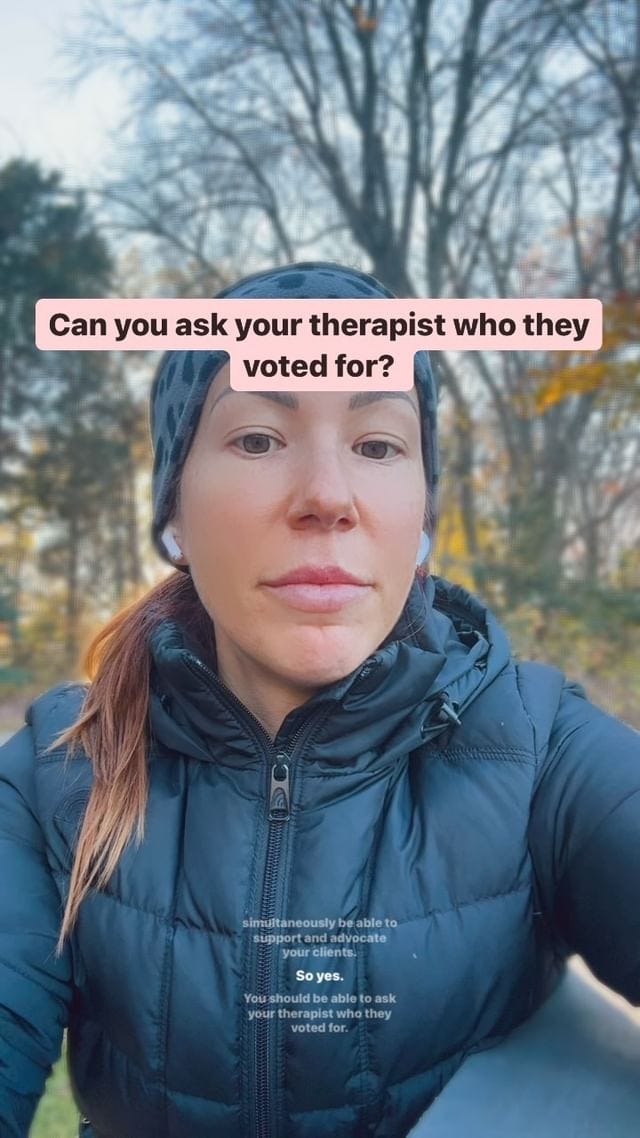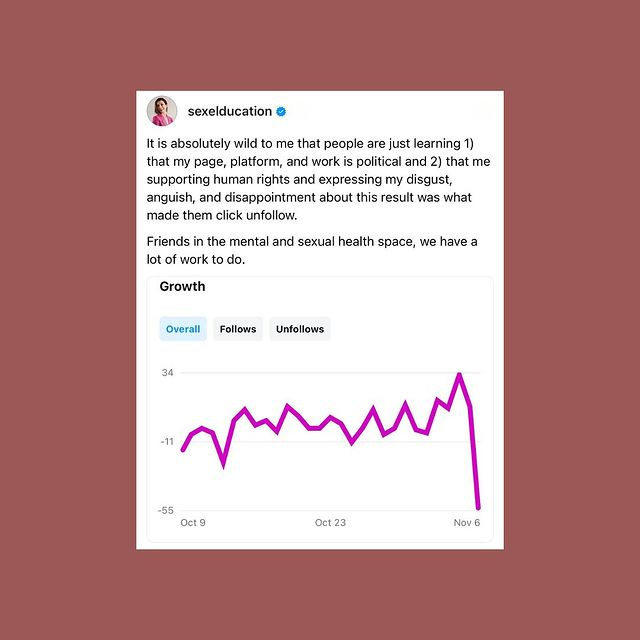You Deserve a Therapist Who Votes for Your Existence
Why "Clinical Neutrality" Is No Longer an Option in 2024
This week, I’ve been going through it.
I’ve cried. I’ve yelled. I’ve felt small. But the rage…that feels constant. It feels at home in my body now. The emotional whiplash is exhausting, but the clarity it brings is necessary.
As an online creator and educator in mental and sexual health, I’ve chosen to share these struggles with my community. This work—my work—is deeply, inherently political. It has to be. And if you're in mental health care or other helping professions, so is yours, whether you want to acknowledge it or not.
I’ve written about my fears regarding sex education under a Trump administration before. Yet somehow, people still express surprise when I voice my disappointment in the election results, when I fight to ensure my community is seen and heard, when I demand that others in this field engage in conversations about basic human rights. As if there's anything "neutral" about staying silent while your clients' rights are stripped away.

The Questions We Can No Longer Avoid
This week, one of my followers asked me, “Can I ask my therapist who they voted for?” It was a question I already felt called to answer, but their vulnerable ask in my comments section prompted me to address it with immediacy.
Behind those words lay all the questions many of us are truly afraid to voice, but desperately need answered:
“Am I in a safe space with you?”
“Do you see me as fully human?”
“Do you actually believe in my right to exist?”
What happened after posting my response on Instagram exposed exactly why these questions are so crucial right now. Before scrolling through the comments section on this video, please proceed with caution—what you’ll see reflects the stark reality of therapy in 2024.
The responses from some supposed “professionals” were devastating and illuminating, a mirror reflecting exactly where we are as a country right now. On TikTok, where I posted another iteration, the pushback was the same: therapists defending their right to keep their political beliefs private, their privilege showing in every word. Even when I called it into question. Even when I pointed out the direct harm to their clients.
I lost a lot of followers that day. But the thing that really gets me is that this was their breaking point. They left when I demanded that mental health professionals be held accountable.
The Cost of Neutrality in 2024
In addition to my Instagram and TikTok videos, I posted on Threads this morning about the topic of asking your therapist who they voted for, which I’m reposting here:
Yes, you can ask your therapist who they voted for. And for all of the therapists getting defensive about this, here’s why you can’t vote for Trump and claim to be a safe space for your clients.
You deserve to know who believes in you. You deserve to know who advocates for and supports your existence. A vote is an act of advocacy, not just for oneself, but for the people and communities we claim to care about.
I do not believe that any therapist that voted for Trump can provide a safe space for their clients. Anyone in a helping profession who voted for a convicted felon can no longer claim to care about human rights.
That said, a lot of therapists are going to be deeply uncomfortable over the next several weeks, months, and years. You will be confronted by many of your clients. Many of us are taught to abstain from sharing our political beliefs and reserving such a disclosure. Yes, self-disclosure should always be in the best interest of the client—this is 100% one of those times.

With 40% of Americans reporting politics as a “major stressor” in their lives (and this was from 2019), be prepared for this to skyrocket in sessions. This is not just someone’s grocery bill, this is someone’s livelihood. Their right to marry, love, exist, access medical care—the list goes on.
There’s also research to support the benefit to not only the client, but also the therapeutic relationship. Two post-2016 election surveys indicate discussions of politics during therapy sessions are rising—with 2/3 of therapists reporting the topic came up during their sessions. This will only rise now.
If you feel some type of way reading this thread, it’s time to sit with the “why.”
How can you provide a safe space for someone who is a survivor of sexual assault when you voted for a rapist for president? There are now men putting “your body my choice” on t-shirts. Your vote just told your clients you don’t believe them, and that these crimes can be overlooked in favor of what appears to benefit you.
How can you provide a safe space for someone who is part of the LGBTQ+ community? You remind your clients that you believe “love is love,” but now their marriage is at risk.
Your client is trans and you think you’re a “good person” because you don’t use their dead name and can use the correct pronouns. Maybe you even display your pronouns in your email signature. Now, their healthcare and gender-affirming care are at risk—supports that are literally life saving to them. Your vote just said “love is love” and “be who you are” but only when it benefits you.
How can you claim to provide a safe space for your Black and Brown clients? Your client, who is a college-aged Black woman, just received a text about being picked up to pick cotton at a plantation. How can she come to a session with you and share in her fears about what this Trump-era means for her, when YOU voted for this?
There are, unfortunately, so many more examples I could draw as to why you cannot be a safe space for your clients if you voted for him. If you have trouble understanding this, it’s exactly why you shouldn’t be in a helping profession. Your privilege continues to shield you to the detriment of your clients.
What You Need To Know Before Asking
Every person should feel empowered to ask their therapist, “Who did you vote for in the 2024 election?” But I need to acknowledge something important: I know not everyone will feel safe or confident doing so. That reality alone speaks volumes about the current state of care in the U.S.
If you are comfortable asking this question, I want you to be prepared for disappointment—whether it comes in the form of an answer you didn’t want to hear, or numbing silence. Therapeutic relationships take time to build. For some, this means months; for others, years. Yet, we’ve all experienced how a single breach of trust can shatter what took so long to build. This conversation may result in that moment for you, and I’m deeply sorry for that pain and realization.
Let me be clear about something: leaving your therapist over their political stance isn't a failure of therapy—it's an act of self-preservation.
This is a time where many of us—myself included—need extra community and mental health support. You deserve a therapist who believes and advocates for your existence. This shouldn’t be hard to find, and it shouldn’t be up for debate. Yet in 2024, we’re still watching people argue that supporting basic human rights is somehow “controversial.”
The Bitter Truth
Many mental health professionals will continue hiding behind a facade of "clinical neutrality" while their clients suffer. They'll continue displaying their perfectly curated "safe space" stickers, pride flags, and pronouns in their email signature while voting for policies that actively harm the very lives they claim to support.
They'll attend cultural competency trainings while refusing to acknowledge how their political choices directly impact their clients' ability to access care. They'll write social media posts about "holding space" while voting to restrict the very freedoms their clients need to survive.
Yes, some therapists who genuinely want to be transparent with you may be bound by organizational policies about disclosure. But know this: therapists who truly believe in you, who voted to protect your rights, who advocate for your existence—they will find ways to let you know and make it known.
This can look like…
Explicitly stating their support for LGBTQ+ rights, racial justice, and reproductive freedom on their websites
Displaying clear positions on human rights issues in their practice policies
Actively engaging in advocacy work outside their practice (and letting you know about it)
Sharing resources from and connections to community organizations
Making their stances clear during initial consultations
To my fellow mental health and helping professionals: Your silence is not neutrality—it's complicity. Your obvious discomfort with this conversation speaks volumes about your privilege. If you're more worried about losing clients over your political stance than your clients are about losing their basic rights, you need to step back and seriously reconsider your role in this field.
Where We Go From Here
In this moment, finding hope feels hard. But here's what gives me a glimmer: I'm watching brave clients demand better. They're asking the hard questions. They're walking away from therapists who won't stand with them, and leaning into communities that truly do support them.
Of the many followers I’ve lost on social media this week, I’ve found a deeper alignment with my community. I find comfort in that perspective as many of us will continue to face the topics of loss and disappointment in our lives over the coming weeks and months.
With Project 2025 looming—threatening comprehensive sex education, gender-affirming care, reproductive access, and basic human rights—we need this alignment more than ever. The systematic dismantling of healthcare access isn't just possible; it's actively being planned. And we need to be ready.
The rage I'm feeling—I want to channel it productively. I genuinely fear for the future of sex education and this field, and I need to take action to protect what we've built together thus far—and I need your help.
What resources from me would help you most right now and in the near future? What support do you need? I value this community and your input will shape what comes next and where I shift my focus for us.
Quick Schedule Update
I am taking a brief pause from Wednesday’s usual Sexual Health Wealth article to focus on rest and renewal. I’ll be back to my regular posting cadence (Sunday/Wednesday) next week.
Thank you for understanding 💜






